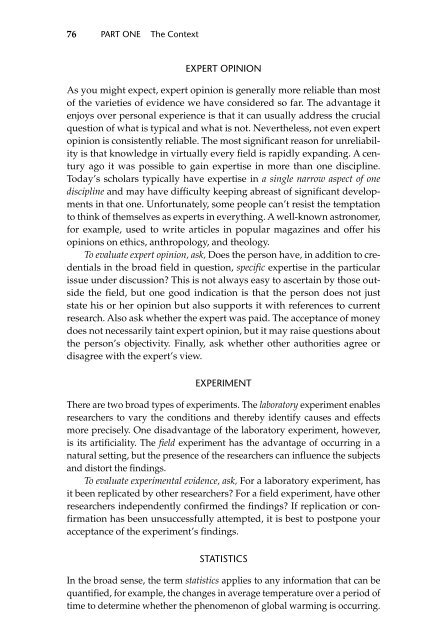Beyond Feelings
Beyond Feelings
Beyond Feelings
You also want an ePaper? Increase the reach of your titles
YUMPU automatically turns print PDFs into web optimized ePapers that Google loves.
76 PART ONE The Context<br />
EXPERT OPINION<br />
As you might expect, expert opinion is generally more reliable than most<br />
of the varieties of evidence we have considered so far. The advantage it<br />
enjoys over personal experience is that it can usually address the crucial<br />
question of what is typical and what is not. Nevertheless, not even expert<br />
opinion is consistently reliable. The most significant reason for unreliability<br />
is that knowledge in virtually every field is rapidly expanding. A century<br />
ago it was possible to gain expertise in more than one discipline.<br />
Today’s scholars typically have expertise in a single narrow aspect of one<br />
discipline and may have difficulty keeping abreast of significant developments<br />
in that one. Unfortunately, some people can’t resist the temptation<br />
to think of themselves as experts in everything. A well-known astronomer,<br />
for example, used to write articles in popular magazines and offer his<br />
opinions on ethics, anthropology, and theology.<br />
To evaluate expert opinion, ask, Does the person have, in addition to credentials<br />
in the broad field in question, specific expertise in the particular<br />
issue under discussion? This is not always easy to ascertain by those outside<br />
the field, but one good indication is that the person does not just<br />
state his or her opinion but also supports it with references to current<br />
research. Also ask whether the expert was paid. The acceptance of money<br />
does not necessarily taint expert opinion, but it may raise questions about<br />
the person’s objectivity. Finally, ask whether other authorities agree or<br />
disagree with the expert’s view.<br />
EXPERIMENT<br />
There are two broad types of experiments. The laboratory experiment enables<br />
researchers to vary the conditions and thereby identify causes and effects<br />
more precisely. One disadvantage of the laboratory experiment, however,<br />
is its artificiality. The field experiment has the advantage of occurring in a<br />
natural setting, but the presence of the researchers can influence the subjects<br />
and distort the findings.<br />
To evaluate experimental evidence, ask, For a laboratory experiment, has<br />
it been replicated by other researchers? For a field experiment, have other<br />
researchers independently confirmed the findings? If replication or confirmation<br />
has been unsuccessfully attempted, it is best to postpone your<br />
acceptance of the experiment’s findings.<br />
STATISTICS<br />
In the broad sense, the term statistics applies to any information that can be<br />
quantified, for example, the changes in average temperature over a period of<br />
time to determine whether the phenomenon of global warming is occurring.


